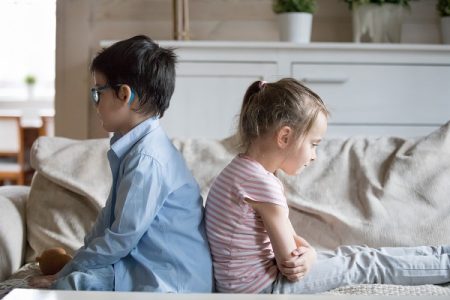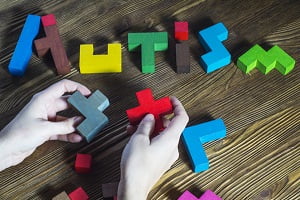What Are the Signs and Symptoms of Autism?
- Updated on: Jul 9, 2024
- 4 min Read
- Published on Apr 23, 2021

Autism Spectrum Disorder (ASD) or autism generally starts before the age of 3 years and lasts lifelong. An early detection of signs and symptoms is done by parents, teachers and peers close to the child. It is however difficult to detect any signs at early ages as the signs may range from low to mild to severely autistic depending upon a child or a person. Autism is a ‘spectrum’ disorder which shows a wide range of signs and symptoms among children and adults. There are two main types of behaviours shown by autistic toddlers, children and adults. It is not necessary that all of these behaviours are shown by everyone who suffers with it. But most people exhibit several of these behavioural characteristics.
Repetitive/Restrictive Behaviours
Social Communication and Interaction Behaviours
Signs occur in autistic people for different prospects of life skills. As Autism is a broad spectrum disorder, it consists of many signs and symptoms shown at different aspects of person for different prospects of the life like such as the following:
Social Skills
It refers to how a person interacts with other persons and the way he talks, analyses, and perceives conversations. Autistic people always face difficulties in socializing and interacting with people. The mode of interaction is different than others and they may be usually lost in their own world. People with autism find difficulties in showing their emotions and expressing their thoughts and even understanding others’ feelings. They are also very sensitive to touch and avoid cuddle and hugs. Some of the examples of social issues are:-
Communication Skills
Every person with autism has different communication skill sets – some are good at speaking while others don’t speak at all. About 40% of children with autism do not speak and talk at all and 25%–30% of the children with autism can use some words at 12 to 18 months of age and then loose these skills later on. Only few are able to speak but not until late childhood. Persons with autism who are able to speak may use languages in unusual ways such as not be able to put words into sentences. Some may say only one word at a time while others repeat the same words, phrases or sentences. Condition of ‘Echolalia’ (a condition in which children repeat the words and phrases what others say) is also seen in autistic children.
Examples of communication issues
Interests and behaviours
The most common sign of autistic people is repetitive behaviour whether repeating words, phrases, or doing same action and motion again and again like clapping, flapping the arms and playing with same toys in same manner. People with autism thrive on routine and they don’t like any change in their routine which also disturbs their behaviour and therefore they lose their mental control.
Examples of unusual interests and behaviours
Development in Children
Children develop at their own pace so it’s difficult to tell which skill sets are developing at which stage of life with autistic people. Autistic children might face difficulty in speaking, socialization and learning but their ability to walk is same as other children of their age. They might be good at video games and puzzles solving than normal children. They usually learn hard skills relatively easily.
Loud noises, smells, and lights
People with autism find loud noise as unpleasant and shocking. They find smells and changes in room temperature also as unpleasant.
- A child or a person with autism may show repetitive behaviour like repeating same words and phrases again and again, repeating same action, etc. They also have unusual behavior like eating same food in breakfast every day, following same routine every day, copying other’s actions or words and playing with same toys or parts of toys.
- Children with autism may show interest in a particular topic like football, statistics, numbers, details etc.
- Autistic people tend to have obsession or interest in one thing such as moving objects or parts of objects etc.
- Babies with autism are not able respond to their name by 12 months of age
- Many babies and children don’t point on objects to show interest by 14 months
- Anxiety in socializing
- Feel troubled in empathizing people
- Have difficulty understanding body language, gestures, facial expressions, social innuendos etc
- They have trouble in making relationship and maintaining it
- They face difficulty in making social behaviours
- Difficulty in understanding double meanings in talks
- Anxiety in groups
- They interpret information too literally
- Face difficulty in making eye contacts
- They have unique interests
- Strict to a rigid daily routine
- Not able to make their future plans
- Not able to respond to name by 12 months of age
- Avoids eye-contact
- They usually prefers to play alone
- Do not want to share interests with others
- They interact with people to attain their desired goals
- They show flat and inappropriate facial expressions
- Don’t understand the meanings of personal space boundaries
- Usually avoid physical contacts like touch and cuddle
- Trouble in understanding other’s feelings.
- Delay in speaking sentences and words and in learning the language
- Repeating words or phrases over and over (Echolalia)
- Pronouncing words in reverse order ( eg., say ‘You’ instead of ‘I’)
- Usually gives dissimilar answers to questions asked
- Doesn’t respond to the point
- Few or no gestures are used
- Talk like singing a song or in a robot like voice
- Not able to understand jokes, teasing and sarcasm
- Lines up toys or other objects usually in rows.
- Timely playing with toys
- Likes some or particular parts of objects (e.g., wheels of toys)
- They are very organized in daily routine
- Minor changes make them upset
- They have certain routines which they follow every day
- They usually do unusual activities like flapping of hands, rocking of the body, or spinning oneself in circles












